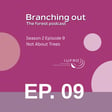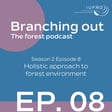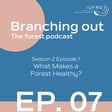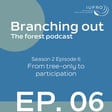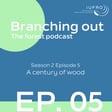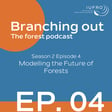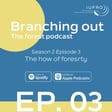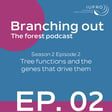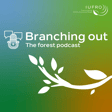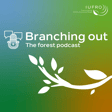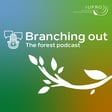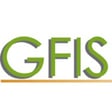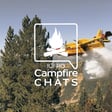Introduction: Branching Out Season 2
00:00:09
Speaker
Thanks for tuning back in to Season 2 of Branching Out, the Forest Podcast. It's great to have you with us again as we explore more forest science content. The podcast is brought to you by IUFRA, the International Union of Forest Research Organization, the global network of forest science cooperation. A UFO is open to all individuals and organizations involved in forest research and forest-related science. Scientists operate in a UFO voluntarily.
IUFRA's Leadership and Vision
00:00:35
Speaker
A UFO's field of scientific activity is it spread over nine divisions, and this is what we are covering on this season. These nine divisions are silviculture, physiology and genetics, forest operations engineering and management, forest assessment modeling and management,
00:00:51
Speaker
forest products, social aspects of forests, and forestry, forest health, and forest policy and economics. And then each of these divisions is broken into units that focus on a specific aspects that fall under the divisional umbrella. And during the last board meeting in June 2024, just after the war congress in Sweden, I hope by the way that you were able to participate,
00:01:16
Speaker
A new leadership model was adopted and now each division has two co-coordinators to improve geographical and gender diversity and balance their work.
Meet the Hosts and Division I Coordinators
00:01:25
Speaker
And I'm Pasebo Lanos from the UFRA headquarters, your host. And to host with me, I brought somebody from the International Forest Student Association. Alex, please introduce yourself, go ahead.
00:01:36
Speaker
My name is Alexander Watson, or Alex, for short. I'm the internal counselor at ETSE, Open World Communications, and the capacity development teams. I also study at Göttingen in Germany, and my master's in tropical forestry. Thank you and welcome. And we have the two core coordinators of Division I with us, and I'd like you to briefly introduce yourself and describe your new roles in EUFRO. First, we start with Teresa. Hello, Jose, and it's nice to see you and everybody here. To our listeners, my name is Treza Fonseca. I am a professor of forest inventory and management at the University of Trazogmont-Chiaodour. Our university is nestled. in the beautiful northern region of Portugal, often called the Marvelous Kingdom by a celebrity national writer. Without wanting to turn this into a promotional moment, allow me to to say that this area is home to UNESCO World Heritage Site. Known for its stunning vineyard, I invite you all to come and enjoy the breathtaking views and savour the exquisite taste of port wine.
00:02:49
Speaker
As a professor dedicated to advancing forest science, I'm also honored to serve as the co-coordinator of Division I for IU Flu, along with Pilsan, where we focus on the vital field of silviculture.
00:03:06
Speaker
Hello, my name is Pilsen Park. I am a professor of agriculture and forest ecology at Seoul National University, Korea. My school is located in a very busy city in Seoul and Korea. I'm a co-coordinator of Yofuro Division I agriculture with Teresa. I started my job in June this year and I've been a deputy coordinator for Division I for the last 10 years and it's very honour to continue the work for Division I and you are all welcome to join Division I. Thank you.
00:03:45
Speaker
I will also take up both your offers to join Division 1 and to come to
Personal Journeys in Forest Research
00:03:50
Speaker
Portugal. in I was wondering, could you share a memorable experience or story from your work that had a significant impact on your research or maybe resulted in you joining Are You Throw?
00:04:03
Speaker
The best part of my job is that I can visit different types of forest and also it's ah wonderful to see just amazing nature and also I can do something to restore or conserve this forest and then try to work to maintain all this wonderful forest and forest the structure.
00:04:24
Speaker
Brilliant, thank you very much. And you, Teresa, do you have a memorable experience or a significant impact that you would like to share with us? One of the most memorable experiences I had was attending an exhibition in London. And it seems that it is not related to our talk today, but it is. And that the exhibition had a profound impact on me, both personally and professionally. The exhibit featured a room designed to resemble like a classroom.
00:04:54
Speaker
with a teacher desk and several students' desks nearly arranged. What was ah truly striking and unforgettable was that the the students' desks were actually cardboard box labeled with word fragile in red letters.
00:05:11
Speaker
In this comparison, the player resonated ah with me as it conveyed so simply, yet so powerfully, the immense responsibility of being a teacher or mentor or a leader. In such roles, people has the ability to make a difference and, hopefully, for the better by guiding individuals along a supportive paths, empowering them ah and helping them to go further.
00:05:38
Speaker
achieving their dreams and goals. This also ties into my association with IU FRU. As I too had the opportunity to be guided on my path to IU FRU by people who believed in me starting at my university and including the researchers from Portugal and abroad. and Within this important network, they facilitated my entry as a deputy coordinator around 17 years ago.
00:06:06
Speaker
and they encourage me to take on other roles within the organization. Anyway, to cut a long story short, these are the people who inspire me and that is the legacy I would like to pass on.
00:06:20
Speaker
Those are two very beautiful pictures, the one with the forest that you create a person and the one with the classroom.
Global Collaboration in IUFRA
00:06:28
Speaker
ah to there today some mention And we go into this topic now specifically because as a UFO being the global network for science cooperation, that means that it spans throughout multiple countries and regions. And and before we go into a specific topic of pseudoculture, I have a question on How can you, in this case, that and in these positions that you are, how can you facilitate collaboration among researchers with diverse backgrounds, with diverse resources and diverse expertise? How do you balance this out?
00:07:02
Speaker
We can facilitate a collaboration among researchers by facilitating the organization of internal groups, such as research groups and working parties with geographical and the background diversity, gender balance, as well as the inclusion of junior scientists. Our own coordination structure reflects geographic and background diversity among our DPT coordinators, including Veronica, Linda, Sven,
00:07:32
Speaker
and the Toshiaki, in addition to our own contribution of course. So, we are trying to encourage the youth through office holders to organize meetings see and events that are ah open to all interested parties, considering that not everyone has the same resources.
00:07:53
Speaker
an issue that can be at least, partially be addressed through the organization of online meetings. So, no one is left behind. So, what do we want to do, is ah to put in practice the vision of, are you through? In terms of diversity.
00:08:13
Speaker
Because we live in the 21st century, it's ah did not just only one country, it's a global era. So now i like i now I'm sitting in the Asian continent, and Teresa is in Europe, and then there are all different regions, because it's global era. So I live, I i work in the Asian region, but also I go to the Southeast Asian area countries, and I visit America, Europe,
00:08:40
Speaker
Also, a lot of people in Europe work in African continents. So those kinds of this global era really pushes us to strengthen the cooperation and collaboration globally. And also there's all different front environmental issues like climate crisis and also biodiversity issues. It's not only one reason problem. It's ah all like the international problem. so that makes us more strengthened in our collaboration. And actually it required, it's necessary that we really have to work together. And then your flow is wonderful platform to widen our networking. Amazing. Thank you very much both for your your answers. and some very beautiful words and phrases in there like inclusion and global era. So with this in mind, how can scientists and participate in Division I at IU FRO?
00:09:41
Speaker
Thank you for raising this question. Scientists can engage with Division I in several ways. I will list a few by becoming an office holder and or subscribing to receive updates from the Division I mailing list.
00:09:58
Speaker
also by participating in activities promoted by the division, expressing interest and becoming part of the division structure, such as serving as a deputy coordinator or a group coordinator, and also hosting activities supported by the division. For example, the Portuguese organization Centro Pinus,
00:10:23
Speaker
facilitated the dissemination of scientific knowledge from the Working Particology and Silviculture of Pine through a set of webinars that they designed and promoted in partnership. So there are a lot of ways that scientists can participate in Division I.
00:10:42
Speaker
Also, if you visit the UFO website, they are the calendar of events. And you can see all a lot of the scientific meetings or seminars or different meetings are going on. And then there are people who host the UFO events.
00:10:58
Speaker
and then you can contact them or you can participate in all the meetings and then also you can like talk to the people and also if you just look at the list ah of the structure you can see all the different like research groups and working parties that you are interested in.
00:11:15
Speaker
And this is important because most of the contacts will be listed somewhere in the website, being that of divisions, working groups, or etc. Now, I think Bilsum already mentioned what Division I is about. I just want to make it clear that Division I is called Silviculture.
00:11:31
Speaker
And silviculture dates back to the origins of forest science, at least in Western Europe, with the term having to say and something around the lines of something that Pilsen already mentioned as well, which is carrying out the forest, which in turn involves cultivation and management of the forest, right? If we go back to 1992 when Ayufro was celebrating the 100th anniversary. The anniversary publication mentions topics like conversion of monocultures to mixed fans and provenance trials and this is still ongoing topics. And also on the last season we heard about robustness and resilience of forests with Jim Petter's Ergolf Escobar. So if you want to complement this episode you can also go back to the first season on episode 2.
00:12:18
Speaker
And I have a question specifically now
Silviculture: From Timber to Ecosystem Services
00:12:20
Speaker
sitting from the perspective of silvic culture. How has the field evolved in recent years in the context of this t twin crisis that you mentioned, build some climate change on the one hand and biodiversity loss?
00:12:34
Speaker
Silviculture started from producing timbers but also we basically the thing silviculture do is establishing forests. So in the forest the dominant species trees and then we plant trees grow trees, maintain forests, and a lot of environmental problems are caused by the decrease in forests. So this is what agriculture has been doing so far. And now people are asking questions about what climate change is going to make this earth would be, what the biodiversity crisis
00:13:14
Speaker
So now it's era of forest restoration. And when you talk about forest restoration, it's like the silviculture technique would it be the core techniques to restore forest. Like we have to decide what kind of stage of forest we would like to aim for what species, what forest the structure, what's their structure. Those air recorders started from timber production, but now I think the air recorders are more focusing on providing ecosystem services, like water, clean air, and those things. So there are more
00:13:53
Speaker
but requirements are more timid for the re-culture technique. I agree with Pilsen said, i would like also to add that for instance in our division, is some challenges have brought specific meetings and also the creation of new groups.
00:14:14
Speaker
inside, I would like to mention some of them, information of the research group ah about the ecology and silviculture of mixed forests, also the working parties of ecology and silviculture of chestnut, and ecology and silviculture of septropical forests, and also for example a working party about FETO technologies and FETO technologies in a sense or refer to use of plants for the remediation of environmental contamination.
00:14:45
Speaker
hear a lot about the doom and gloom, but the era of forest restoration is a really great, brings a great image to my mind. So in the vein of evolution talking about evolution, and it's full of like minor but so significant good moments from the daily grind to Eureka.
Research Breakthroughs in Division I
00:15:03
Speaker
So I was wondering if you could both share with us some of the most significant findings or breakthroughs that have emerged through division one research like these working groups you were talking about because science is not isolated we cannot isolate the silver culture from the the other parts so this is very important and the reflects on the advances so maybe it is not just one big advancement in silviculture. Now we don't just work for timber, but we also have to work with productivity, but also the ecosystem services, and also there are the people. So these are the big three parts that I think the silviculture is facing now.
00:15:49
Speaker
And also, when I think back, the em involvement of Southeast Asian countries, like a tropical countries, has increased. A couple of decades ago, it was more like some people from temperate regions, but these days, we had much more colleagues working in tropics.
00:16:08
Speaker
This is important because we started talking about diversity. So this is actually what we're here for, right? And um you mentioned the element of people as well. And the next question is related to people because when I'm writing the script for this podcast and when I'm trying to think what questions could I ask that will be meaningful for the people who are here in the podcast, how can people, how can the public support what we're talking here? So in this case, simply culture, how do people get in touch with that?
00:16:38
Speaker
I completely agree on bringing the science to the public, and I have always appreciated IU flow, motto, interconnecting, forest, science, and people. It is everything there. so But how can we implement this? So maybe we could invite to those that are listening to us to get in touch with us and sign up for our mailing list and to share ah the ideas and thoughts.
00:17:06
Speaker
What are the concerns that they have? Are there any aspects we might be overlooking that could be improved through better communication? We would like to engage more with people and in case they would like to contact us, they are very welcome.
00:17:22
Speaker
Sometimes I get complaints that the terminology in semiconductor is too difficult. When you think regeneration or direct seeding or site preparation, people don't have no idea what they are talking about. And also because more people live in urban,
00:17:41
Speaker
area, they're more far away from forest, so they're kind of not really familiar with terminologies and other things. And I think that's why we still have to work harder to make people understand And some people still think that silviculture is about just producing timber. But we work in plantations because we need wood. But I think we more people in silviculture work to restore forest or conserve forest. And also we work in a lot of environmental issues. So the thing we have to put more effort is that silviculture is not only for timber.
00:18:26
Speaker
I love that some of your significant moments are more to do with people and collaboration rather than the research. And this brings to mind something one of my professors always says, which is forests aren't just about trees, they are about people, which always really stuck with me. Moving on from the past, I'd like to talk a little bit about the future and the outlook.
Future Challenges: Climate Change and AI
00:18:48
Speaker
What are the the next big questions or challenges in Silver Culture that Division 1 is really eager to tackle? One of the challenges we face today, and it was already referred, is climate change and its impact on the world. It affects forests, which in turn affects people's lives. Another challenge was also mentioned by Pilsen, to ensure that future forests meet to the growing global demand, not only in the terms of provision, but other ecosystem services.
00:19:22
Speaker
Another topic that ah I would say is ah artificial intelligence and how we can integrate it into silviculture to improve forest and landscape planning and management, taking into account the unique characteristic of each forest system and management objectives and risks. And I think it it will be a very valuable support. In addition, I would say that the research should focus on or result in social benefits, including forest education, that is very important, and improved the communication of research result that it was already mentioned today. And there is another thing that I would like to add to this that is important to provide people with access to accurate information, not only information, but accurate, and time for reflection before taking action.
00:20:17
Speaker
I feel this in my life. It seems that we are always running from one thing to another thing. There are a lot of information that appears and sometimes we need to have time to understand that type of information and after to take action. These are some of my ideas in terms of big questions or challenges.
00:20:40
Speaker
I think that the amount of information that one has to deal with every day is just overwhelming, just to put it lightly. um And I will stay with Pearson because I know that there's going to be a conference in Korea in next year, in September, and the conference is climate crisis, coming for forests
Jeju Island Conference: Climate Crisis Focus
00:20:59
Speaker
at risk. Could you tell us a little bit of what we can expect from that?
00:21:02
Speaker
Yes, it will be held in Jeju Island. That is the southern end of Korea. It's gonna be in the third week of September. So the people really worry about maintaining forest there. So they decided to hold a big conference and then get together.
00:21:21
Speaker
experts in the world who worry about conifer crisis, so they would get all the information on and exchange what happened in other regions, and then try to find a solution to conserve and then protect those trees, especially in the conifers, because you can see the conifer in the top mountain and then also the conifers in the near the ocean, near the sea. So all different types of conifers.
00:21:57
Speaker
what does it take to be successful in an organization like are eu for UFRO is the organization and the people in UFRO are all work for forests. We try to make, conserve, protect, and it use forests. So UFRO is all about forests and people. and So we have the common goals, common mission, and then we try to contribute our research capacity to society. UFRO has been doing that job so far more than 100 years.
00:22:31
Speaker
so I think it's the key of UFRO and another big part of UFRO is networking because the people are all over the world. UFRO is building a solid foundation for a better future, not just forests because forests are very
Get Involved: Local Forest Management
00:22:51
Speaker
important but also affect people and also biodiversity and as a very, very fundamental role in this issue. The key message is get involved, be positive and work for people and forests. Sounds like a very good wrap-up message. I had another one just that I thought of like to encourage people to our audience to learn about the management of their local forests, consider the stories that each of these forests hold, right? And with that, I'd like to thank our
00:23:25
Speaker
panelists here today. Alex, an excellent job. And thank you to Theres and Pilsum. And also, I'd like to thank our listeners. Look out for our next branching out, where we explore the second division of IUFRO. If you want to know more about IUFRO, follow our social media or click the link on the show notes. And thank you very much to the three of you for being here. Thank you, Jose, for inviting us. Thank you so much. Thank you.

